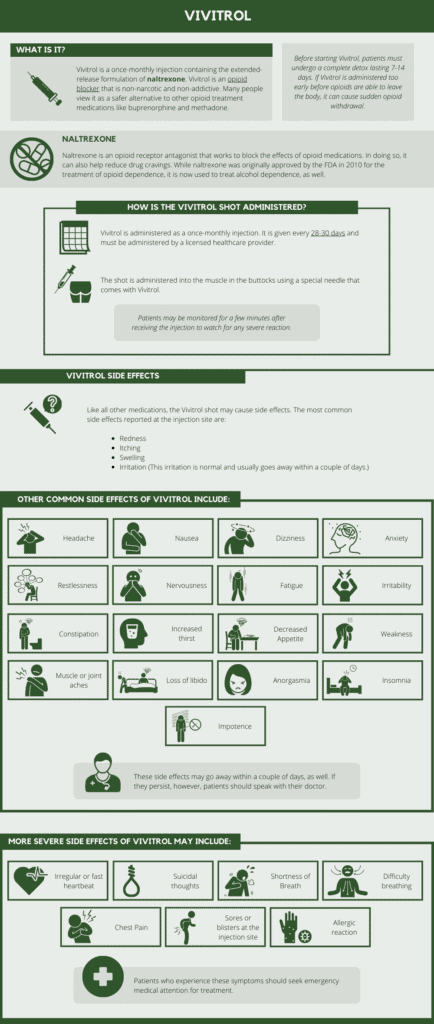The Vivitrol shot is a safe and highly effective treatment medication that is used to treat alcohol and opioid dependence. These monthly injections are low-maintenance, not habit-forming, and can help prevent relapse and cravings. However, Vivitrol is a fairly new medication that has recently begun gaining popularity in the field of addiction treatment. As a result, many people have questions about how the Vivitrol shot works. Here is everything you need to know.

What is Vivitrol?
Vivitrol is a once-monthly injection containing the extended-release formulation of naltrexone. Naltrexone is an opioid receptor antagonist that works to block the effects of opioid medications. In doing so, it can also help reduce drug cravings. The FDA first approved Naltrexone in 2010 for the treatment of opioid dependence. Today, Naltrexone is also used to treat alcohol dependence.[1]
Vivitrol is an opioid blocker that is non-narcotic and non-addictive. Many people view it as a safer alternative to other opioid treatment medications like buprenorphine and methadone. Before starting Vivitrol, patients must undergo a complete detox lasting 7-14 days. Vivitrol may cause immediate withdrawal symptoms if it is administered too soon after a person’s last dose of opioids. Lastly, patients are required to participate in counseling while taking Vivitrol.
How is The Vivitrol Shot Administered?
Vivitrol is administered as a once-monthly injection. It is given every 28-30 days and must be administered by a licensed healthcare provider. The shot is administered into the muscle in the buttocks using a special needle that comes with Vivitrol.[2]
Patients may be monitored for a few minutes after receiving the injection to watch for any severe reaction. After leaving the doctor’s office, patients are expected to participate in counseling, treatment, and daily activities. They will also be given an appointment date and time to receive their next Vivitrol injection.
Vivitrol Side Effects
Like all other medications, the Vivitrol shot may cause side effects. The most common side effects reported are redness, itching, swelling, and irritation at the injection site. This irritation is normal and usually goes away within a couple of days.[3]
Other common side effects of Vivitrol include:
- Headache
- Nausea
- Dizziness
- Anxiety
- Restlessness
- Nervousness
- Fatigue
- Irritability
- Constipation
- Increased thirst
- Decreased appetite
- Weakness
- Muscle or joint aches
- Decreased sex drive
- Difficulty having an orgasm
- Insomnia
- Impotence
These side effects may go away within a couple of days, as well. If they persist, however, patients should speak with their doctor.
Other less common, yet more severe side effects of Vivitrol may include:
- Irregular or fast heartbeat
- Suicidal thoughts
- Shortness of breath
- Difficulty breathing
- Chest pain
- Sores or blisters at the injection site
- Allergic reaction
Warnings and Precautions of the Vivitrol Shot
Patients should not take other medications while on Vivitrol unless they are advised to do so by their doctor. Vivitrol interacts negatively with narcotic pain relievers, heroin, and alcohol. As a result, patients should avoid taking narcotics, opioids, or alcohol while taking Vivitrol.
People who are taking Vivitrol should also be participating in behavioral therapy and counseling. A comprehensive approach that involves counseling and individualized therapy can increase the efficacy of the Vivitrol shot. However, people who do not participate in counseling may risk relapse, especially when they stop taking Vivitrol.
While Vivitrol is considered extremely safe and has a very low risk for abuse, there are a few warnings patients should be aware of. These include:
- Injection site reactions are completely normal. They are usually minor and get better with time.
- Naltrexone blocks the effects of opioids, but if users try to overcome this blocking effect by taking large amounts of opioids, they may experience a fatal opioid overdose.
- Patients who receive the shot before completing detox may go into sudden opioid withdrawal.[3]
It is vital that patients are honest with their physician about their substance abuse and their symptoms to ensure the safety and efficacy of Vivitrol.
How Long Do People Stay On Vivitrol?
Researchers have found Vivitrol is safe and effective for both short and long-term use. As a result, patients may continue taking Vivitrol for as long as they need to accomplish their treatment goals.
Some patients may only receive Vivitrol injections during the months they are in treatment. Others will continue long-term care where they return to the rehab facility regularly for follow-up sessions and monthly injections. The vast majority of addiction professionals will encourage patients to take Vivitrol for at least one year.
The good news is naltrexone is not physically addictive, so the brain and body won’t become dependent on Vivitrol. Other opioid treatment medications, like Suboxone and methadone, are physically dependent and can cause withdrawal symptoms. Vivitrol, on the other hand, does not. Patients can simply stop taking Vivitrol when their doctor says they are ready without worrying about withdrawal symptoms.
With that being said, patients should always consult with their doctor before stopping Vivitrol treatment. They should also continue showing up for their scheduled shot until their physician clears them to stop taking the medication.

Get The Care You Need and Deserve
Woburn Addiction Treatment is a leader in the addiction treatment field, with proven success in facilitating long-term recovery. Our team of top clinical & medical experts specializes in treating addiction coupled with mental illness, ensuring that each person receives individualized care. Call us – we’re available 24/day, 7 days/week.
Find Out if The Vivitrol Shot is Right For You
Woburn Addiction Treatment can help you determine whether or not Vivitrol is right for you. Our medication-assisted treatment (MAT) program aims to help patients overcome their opioid or alcohol addictions with the use of FDA-approved medications and individualized therapy. If the Vivitrol shot isn’t right for you, we will help you find a medication and a treatment plan that will put you on your way to sobriety. Pick up the phone and contact one of our dedicated treatment providers today to learn more about Vivitrol
References:


